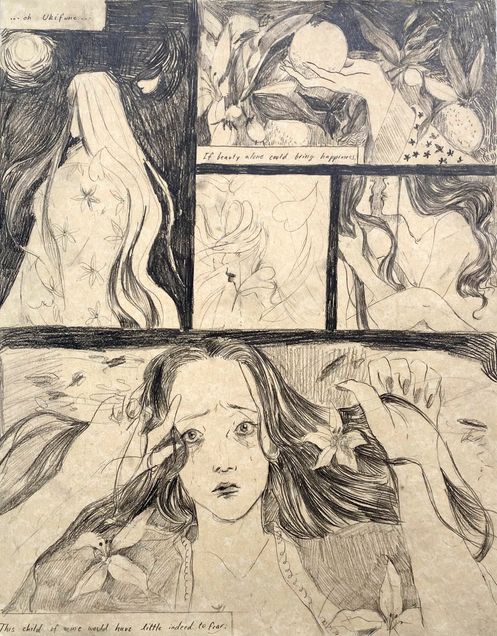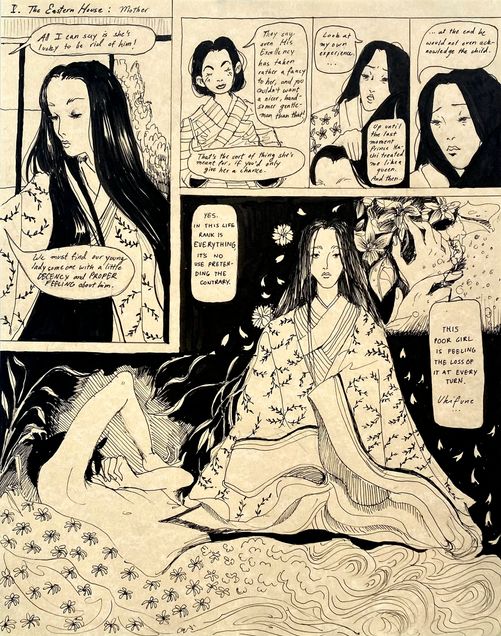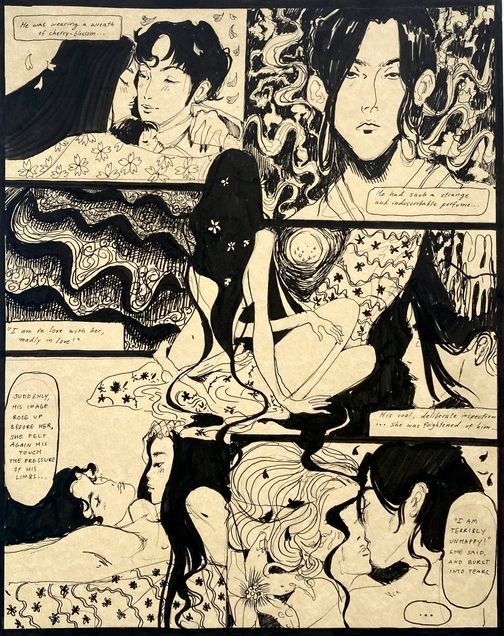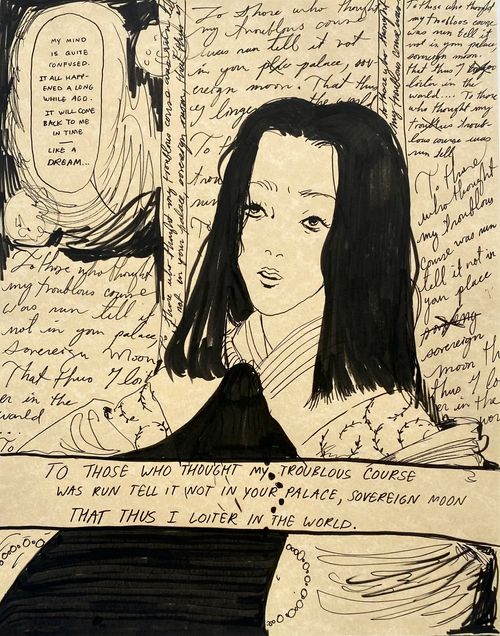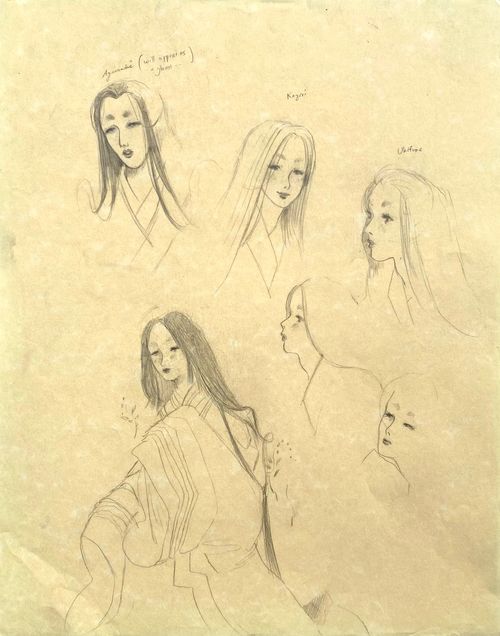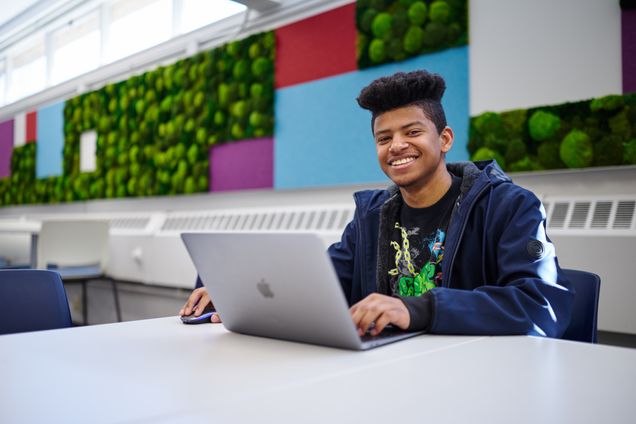News
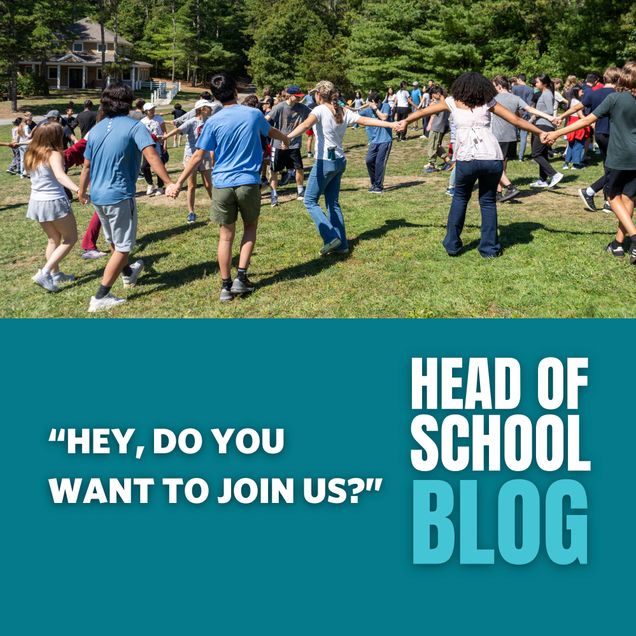
“Hey, do you want to join us?”
I’m writing from Camp Burgess, our annual outdoor orientation trip for 9th and 10th graders. Days are filled with kayaking and swimming in the lake, high-ropes courses, zip lines, farm tours, group puzzle challenges, and rock-wall climbs. The evenings have featured night hikes, board games, a talent show by the campfire, and a sing-a-long. All throughout, there has been plenty of down time for kids to be together and make friends – what this trip is all about.
Yesterday, between activities, I walked past a few new 9th graders sitting together playing cards. One of them noticed a classmate standing on their own in the periphery. In a casual, comfortable way, one of the kids at the table turned to that classmate and said, “Hey, do you want to join us?” “Sure,” the other said, sat down, and integrated right in.
It was simple, subtle, and beautiful – exactly what we expect in a community that prides itself on kindness. Kindness requires more than good intentions and more than manners. A culture of kindness is created and perpetuated by individuals who make the effort to help others feel like they belong. It is a rare thing to be in a community where kindness is the norm. From what I have seen these past few days, it is going to be a very good year.
View more photos from our week at Camp Burgess here.
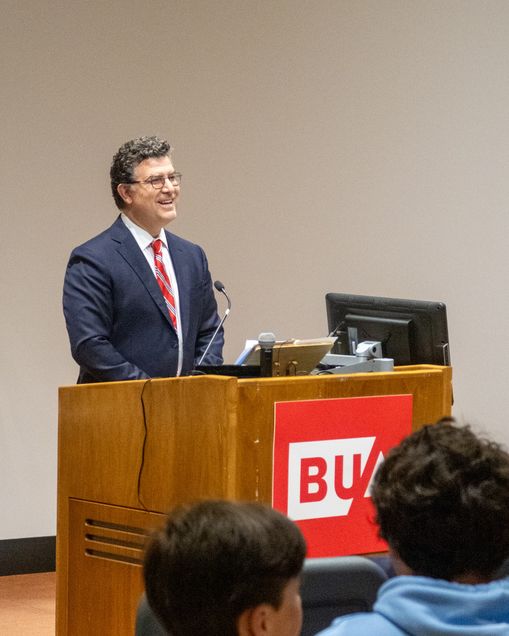
On Being There: Head of School Chris Kolovos Delivers Opening-of-Term Address
On Tuesday, September 2, 2025, Boston University Academy Head of School Chris Kolovos welcomed students, faculty, and staff back to school with opening remarks entitled "On Being There." Read the full text of his ASM talk below.
 Good morning. On behalf of the faculty and staff, welcome to the 33rd year of Boston University Academy.
Good morning. On behalf of the faculty and staff, welcome to the 33rd year of Boston University Academy.
I hope the summer has been a good one for you and your families. To our new ninth-grade and to you new students in the 10th and 11th grades, we are so glad you are with us. You will make us better, not just with your individual talents, but with the curiosity and kindness that binds you to all of us. Welcome. To the Class of 2026, welcome back. Seniors set the tone for the community. You all are a big reason why I am so confident that this will be a great year. In a few moments, I will have the pleasure of introducing Elise Despujols, your Student Council President.
Before that, though, I will offer some thoughts as I do at the start of each term. My topic today is something that we do quite well – being there for one another. I’ll take it in three parts: showing up, being present, and listening.
Showing Up
First, showing up.
One of my favorite new traditions at the school is the performance by members of the school’s Dance Club. The Dance Show is an impressive and energetic culmination of months of choreography and rehearsals. It also takes place at a peculiar time: the afternoon of the last day of BUA June exams – a time when students would be forgiven for going home early for a nap, heading out with friends for bubble tea, or strolling the shops on Newbury Street. But that afternoon, every seat – and some of the floor – of the Black Box Theater is filled with students and faculty audience members, including seniors who graduated more than two weeks earlier.
There is a culture here of showing up for one another. Some of you attended last year’s commencement, when graduating senior Rose Cairo spoke powerfully about this phenomenon as part of her address. She described how much it meant to her to have friends on the sidelines of fall fest soccer games and at championship basketball games cheering for her and holding handmade signs. I was not the athlete that Rose was, but I can tell you exactly where my best friends were sitting during the musical I performed in in my senior year. I can tell you where my faculty advisor was sitting. Three decades later, I remember that they showed up.
Beyond its power for the individual, showing up is also how we build community. We don’t just come to Fall Fest to cheer on our friends on the field, but to be together and share an experience. It rallies spirits and binds us together – as does Lock In, the Cabaret, Be Together, and the dozens of games, performances, and events you all work so hard to organize. Rose recognized that the way we show up for and with one another is a rare and beautiful thing – one that should be cherished.
Being Present
As I think about the second point in my talk this morning, being present, my mind turns to home. Several of you have warmly asked how my summer was. The truth is that we didn’t do much – we mostly stayed around the house and neighborhood. We made the most out of trips with our three little kids to the park down the street and to the splash pad near the local high school. We read lots of books together, watched every episode of Bluey multiple times, and baked too much banana bread. I had some guilt about not doing anything more adventurous or memorable until our son put my mind at ease. Charlie, who is starting kindergarten today, told me last week that he really loved his summer vacation. When I asked him why, he said, “Because we got to spend so much special time together.” I feel the same way.
It is getting harder to be present and devote our attention where it belongs. There is an entire economy, nascent when I was your age, that now conspires to distract us from the people and real-life activities that bring deep fulfilment. Some of the largest corporations in human history leverage technology, biology, and psychology to manipulate us and pull our attention into a small electronic box in our pockets. In his recent book, The Sirens’ Call, Chris Hayes compares the attention economy to the mythological sirens whose song would have shipwrecked Odysseus’s men had it not been for Circe’s warning and Odysseus’s decision to lash himself to the mast. I say this not with the judgment of a middle-aged purist, but as somebody who also struggles to ignore phone notifications and to stop scrolling to the next video.
There are so many places where we successfully buck this trend. Our classrooms are oases of attention. We get lost in one another’s ideas, complex problems, and foundational literature. You 9th and 10th graders will head off to Camp Burgess tomorrow – a phone-free, relationship-rich hallmark of this community. There’s a reason why our expectations when you enter this room before the start of an all-school meeting is that you put your phone away and talk to your neighbors. You are surrounded by interesting, empathetic, and talented people. We don’t want you to miss out on a minute with them.
Listening
My last set of thoughts today is about listening.
There is a children’s book we read often in our house called The Rabbit Listened by Cori Doerrfeld. At the start of the story, we find a curly-haired child, Taylor, wearing light blue and white striped one-piece pajamas, building a towering, intricate block castle. Taylor is so proud, but then heartbroken when a flock of birds knocks down the creation. A series of well meaning animals visits Taylor. The chicken offers to talk about what happened, but Taylor doesn’t feel like talking, and the chicken leaves. A bear is next, offering to shout about what happened with Taylor, but Taylor is again uninterested, leading to the bear’s departure. The pattern repeats with the elephant, who offers to rebuild the castle exactly how it was, the hyena who laughs it off, the ostrich who wants to pretend it didn’t happen, the kangaroo who suggests throwing it all away, and the snake who whispers that Taylor should knock down someone else’s creation. All are rebuffed and all leave.
Until the rabbit comes. I’ll quote this next part. “In the quiet, Taylor didn’t even notice the rabbit. But it moved closer, and closer. Until Taylor could feel its warm body. Together they sat in silence until Taylor said, ‘Please stay with me.’ The rabbit listened.” In the next few pages, the rabbit listens as Taylor talks, shouts, laughs, and considers plans mirroring the other animals’ suggestions. It then continues: “Through it all, the rabbit never left. And when the time was right, the rabbit listened to Taylor’s plan to build again. ‘I can’t wait,’ Taylor said. ‘It’s going to be amazing.’”
As teenagers, I imagine many of you often find yourselves on the receiving end of advice when what you may most need or want is somebody to listen and simply be there. I also imagine you can each think of a friend or family member who, in your time of struggle, was there for you in a quiet way and with an open ear. I share this story not to urge you to be better listeners; I think that is an area where so many of you excel. I share it to remind you of the power of the simple gift of your attentive presence to others. You can – and do – make others’ lives better simply by being there, listening, and being your kind and curious selves.
*****
Thank you for showing up. Thank you for being present. Thank you for listening. I wish all of you a wonderful school year.
BUA Building Undergoes Historical Restoration
Not one to miss out on wellness trends, Boston University Academy is getting a glow-up.
Beneath the scaffolding and plywood, the exterior of our building at One University Road is undergoing a transformation. Over nearly a century of Boston winters, the adhesive bonding the building’s concrete façade to the substructure began to detach, impacting the safety and stability of the structure. The renovation project currently underway will reinforce the façade and replace the decorative panels with identical replicas of the originals. The results of this historical restoration – like the best of facelifts – will be subtle but apparent, strengthening the structural integrity of the façade and highlighting the natural beauty of our historic Art Deco building.
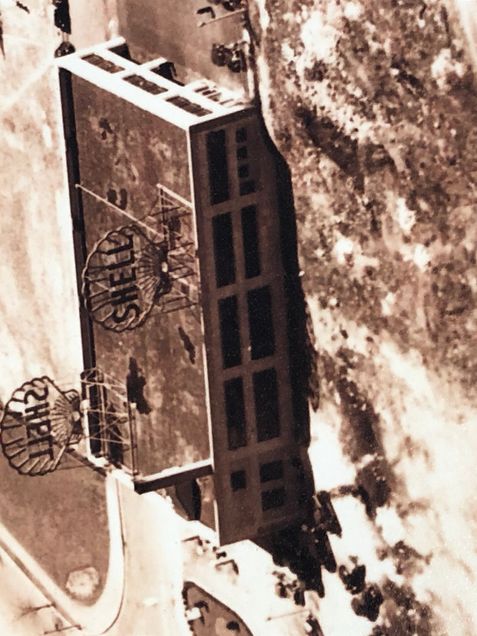 Constructed in 1931 and designed by the architect Gilbert Miles Ramsey, the building at One University Road was the original home of the Shell Oil Company, part of Commonwealth Avenue’s historic auto mile. The hard-to-miss yellow and red Shell sign, now located on top of the Shell gas station across the river on Memorial Drive, once perched proudly atop what is now the BUA building.
Constructed in 1931 and designed by the architect Gilbert Miles Ramsey, the building at One University Road was the original home of the Shell Oil Company, part of Commonwealth Avenue’s historic auto mile. The hard-to-miss yellow and red Shell sign, now located on top of the Shell gas station across the river on Memorial Drive, once perched proudly atop what is now the BUA building.
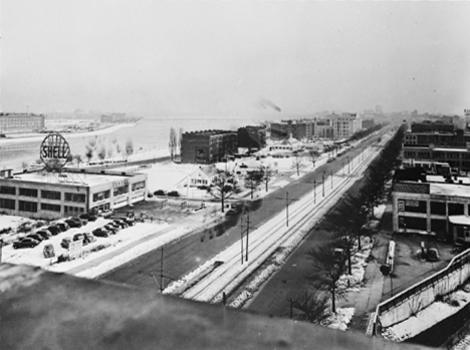
Today, the building’s origins are still visible in the scallop motif on the façade of the structure. As part of the historical restoration, undertaken in partnership with Boston University’s Office of Campus Planning and Operations, these decorative panels are being removed and recast from the originals using 3D laser scanning – a lengthy and exacting process involving not just contractors but also skilled craftspeople. The replicas will be reinstalled using modern construction technology.
The renovation will take place over the coming months, with an estimated completion date of August 2026. Thank you for your forbearance as our school building undergoes this exciting historical restoration. We look forward to revealing the results of this project to our community in the fall of next year!

BUA Milestone: Celebrating Nick Dent’s 20th Year
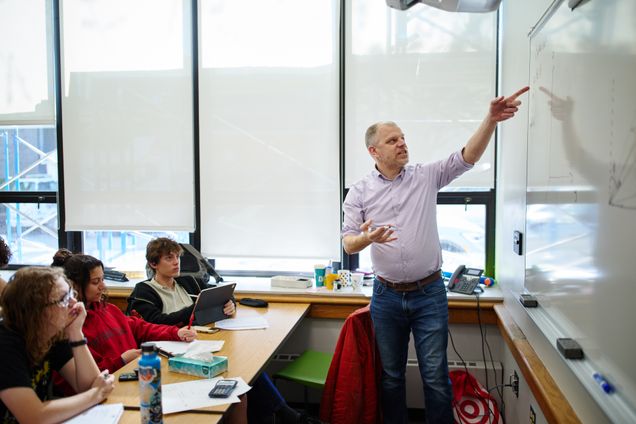 This year, longtime math teacher Nick Dent celebrates his 20th year at BUA. In the classroom, as an advisor, on the ultimate field, and everywhere in between, Mr. Dent’s deep care for his subject and his students – along with his signature brand of sarcasm and his puzzle prowess – have become fixtures of the BUA community.
This year, longtime math teacher Nick Dent celebrates his 20th year at BUA. In the classroom, as an advisor, on the ultimate field, and everywhere in between, Mr. Dent’s deep care for his subject and his students – along with his signature brand of sarcasm and his puzzle prowess – have become fixtures of the BUA community.
To honor this milestone, we asked alumni to share their favorite Mr. Dent memories and gratitudes. Of the many, many submissions we received, here are some of the highlights:
“I still remember when you were first introduced as the young new teacher at BUA. It was almost a shock to see someone who hadn't been at BUA since the ‘90s. Seeing you now as one of the senior leaders at the school is a testament to how much the school has grown around you. It's been great to come back to BUA events and see you there, still looking like the youngest new member of the faculty and bringing the same energy 20 years later.” - Natan Magid '06
“I remember you joining BUA and teaching me pre-calc in 2005. I thought you were SO cool. Twenty years later, you're older and (I assume) somewhat less cool. So am I. I remember you taking your job seriously without taking yourself too seriously. You laughed at my hijinks without letting me slide. You played basketball and frisbee with us, and you gave max effort the whole time. And you were really, infectiously, interested in math. I learned a lot in your class. What's cooler than that? Thinking that you've done this for twenty years of BUA students makes me smile, and it makes me proud to be an alum.” -Ian Beatty '08
“I feel so lucky to have been a part of your inaugural class at BUA. I still fondly remember you playfully mocking me for saying I was bad at math. While I still sometimes feel that way, your encouragement continues to inspire me to persist in the face of challenges that have come up in my work. It's amazing how thoughtful and empathetic you were even when just starting your career. I can only imagine what an amazing teacher and mentor you are now. Congratulations!” - Adam Bear '09
“I remember starting my time at BUA at the same time as Mr. Dent. It was so fun to have his fresh energy in the school, his passion for teaching, and of course his competitiveness at ultimate. Mr. Dent made everything seem thrilling, from calculus to weekend tournaments. I hope your entire time at BUA has been as exciting as those four years when I was there.” - Evan Thomas '09
“Thank you Mr. Dent for shaping so much of my positive experience at BUA. The number of times you checked in on me in high school meant a lot, not only because it’s already a difficult time as an adolescent, but because it demonstrated how much you care about your students both in and outside the classroom. I hope all of your students over the past 20 years know and remember how much you care for every one of them.” - Leah Magid Herbert '13
“I am so grateful to have had you for three of my four years at BUA – your patience, intellect, and sense of humor made 8:00 a.m. (yuck) math class (barf) much easier to stomach. High school was a challenging time for me, but you were consistently a positive presence. And thanks to you, stats class in college was a BREEZE! I have no doubt that you've brightened the lives of many young people running high on emotions and low on sleep. Thank you!” - Orly Lipset '15
“Congratulations on 20 years at BUA! You were an amazing advisor in my 9th and 10th grade years, and I always felt that you truly understood and supported me. I'll always remember the good times we had solving math problems for fun in advisory, and one particularly memorable week where you brought in lock-picking tools. Even after I moved on to BU math classes, you were always happy to help when I needed it. BUA would not be the place it is without teachers like you!” - Aditi Deokar '21
“As Helly R. says in the hit Apple TV+ show Severance, ‘the numbers were scary,’ and that’s certainly what they were for me. Mr. Dent made math a lot less scary, and at times even enjoyable for me. I truly don’t know how I would’ve gotten through BUA had he not let me sit in his classroom and work through all those problems outside of class time – even when he wasn’t teaching me math that year! His belief in me and my ability to conquer challenges when I was a BUA student continues to support me today even when I’m nearing my senior year of college. So congrats on 20 years at BUA, Mr. Dent! You rock!” -Julia Dickinson '22
“Thank you for your seemingly-bottomless well of patience and how earnestly you engage with students of ranging math abilities. I know I, and so many others, were/are thankful for it during our time at BUA.” -A Boudreau '23
“Congratulations on your 20-year anniversary at BUA! I wanted to take a moment to thank you for the impact you had on my time there. You were the first math teacher I had at BUA, and you truly helped me become more comfortable with the subject. Your patience and encouragement made it easier for me to focus on my individual growth, which in turn made my overall experience at BUA much more enjoyable. I am so grateful for the support you gave me in those early days.” - Theo Sloan '23
Saoirse Killion ’21 Featured in BU’s Department of World Languages and Literatures Journal
Saoirse (BUA'21) graduated this spring from Boston University with a BA in Comparative Literature and a BFA in Painting. While at BU, her comic Ukifune was featured in Alexandria, a student-led journal within BU's Department of World Language and Literatures. View Saoirse's comic below and read more about Ukifune, along with insights into its origins, meaning, and the creative techniques.
Ukifune, a comic based on the last ten Uji chapters of Murasaki Shikibu’s early 11th century novel The Tale of Genji visualizes castaway Princess Ukifune’s experiences with beauty, social class, and femininity as she writes about her past, fraught relationships with two handsome but overbearing suitors. Murasaki Shikibu was a lady-in-waiting for Empress Shōshi during Japan’s Heian period (794 - 1195) and an accomplished writer who, in her masterpiece often considered the world’s first novel, depicted the personal lives of high courtiers in the Heian capital. Ukifune’s source text is British sinologist Arthur Waley’s (1889 - 1966) 1920’s translation of The Tale of Genji. The comic visualizes Ukifune’s psychological struggle with her physical beauty and low social standing, drawing inspiration from both American and Japanese visual narrative techniques, and emakimono (12th century Japanese scroll paintings). The comic is ink and brush on calligraphy paper, materially mimicking Ukifune as she, now a Buddhist nun, claims ownership of her body and psyche with poetry.
Ukifune recites to herself, as “a theme for writing practice”, the following poem:
To those who thought my troublous course was run tell it not in your palace, sovereign moon, that thus I loiter in the world.

Rising Junior’s Research on the Role of Black Women in WWII Featured in “Celebrating Juneteenth” Showcase
 Rising junior Dora M. 27's research project, entitled "Chasing Justice: Rights and Responsibility of African American Women in WWII,” was featured in National History Day Massachusetts 2025 “Celebrating Juneteenth” virtual showcase. Dora's project was selected from over 700 entries as an outstanding example of research highlighting stories of African American history, culture, achievement, and freedom.
Rising junior Dora M. 27's research project, entitled "Chasing Justice: Rights and Responsibility of African American Women in WWII,” was featured in National History Day Massachusetts 2025 “Celebrating Juneteenth” virtual showcase. Dora's project was selected from over 700 entries as an outstanding example of research highlighting stories of African American history, culture, achievement, and freedom.
Dora's exhibit explores the role of Black American women across WWII, from the Black Rosies to the Red Cross to the 6888th Battalion, and their fight to fulfill their responsibilities and gain equal rights both in the military and society at large. The project was inspired by a film about the 6888th Central Postal Directory Battalion, the only all-Black, all-female unit in the Women's Army Corps (WAC).
Dora elaborates: "I give credit to the trailer for WAC’s 6888th Battalion— this video initially captured my attention and kindled my interest for rights and responsibilities in World War II. The movie, first premiered in December, retold the story of a group of trained Black female soldiers who went abroad to sort mail for America. I expected inspirational comments below the video, but I was taken aback by the countless negative exclamations along the lines of 'Why should we waste our time watching people sort mail?' I was piqued by those comments and thus began my dive into the turbulent war history where Black women triumphed over the double discrimination and earned their respective recognition."
The Massachusetts Historical Society's annual National History Day Massachusetts Juneteenth exhibition, launched in 2020, aims to promote understanding of and engagement with the Juneteenth holiday, highlight select NHD student projects whose work explores topics related to African American history, culture, achievement, and freedom, and to spread awareness of these often-marginalized historical narratives.
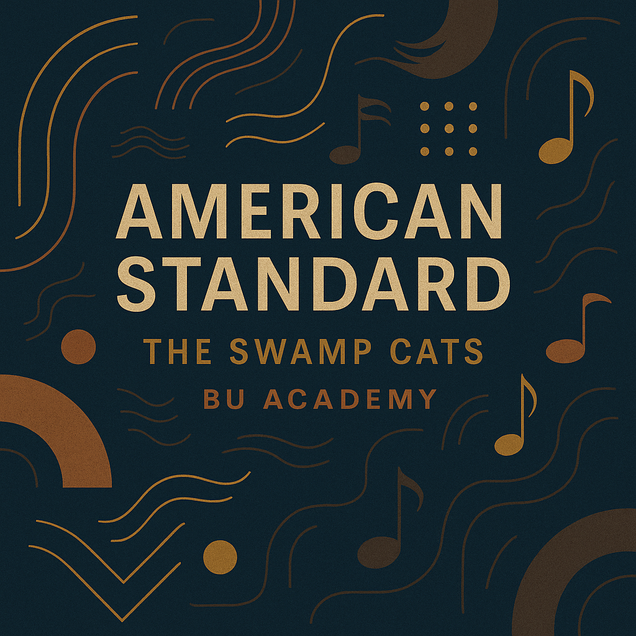
The Swamp Cats Release Two Studio Albums
The Swamp Cats are thrilled to announce the release of two incredible albums this year!
The first album, American Standard, was recorded in the BUA music studio during October and November 2024. Featuring fresh takes on beloved classics like “Bye Bye Blackbird” and “St. Louis Blues,” all 6 songs on the album are Jazz standards which the Swamp Cats have added their own style and flair to.
The second album, Goddess, was recorded in the BUA music studio during March and April 2025. A departure from the Swamp Cats’ typical setlist and outside the typical Jazz idiom, the album is an homage to some of the greatest voices of all time, including styles such as Gospel, Funk, R&B, and Pop. The Swamp Cats would like to thank the original singers of these pieces for giving a voice to the voiceless: Dionne Warwick, Aretha Franklin, Odetta, Etta James, Billie Holiday, and Nina Simone.
Swamp Cats Band Members 2024-2025
Voice: Bella '25, Camilla '26, Alexandros '27
Piano/Hammond B3: Ada ‘25, Matthew ‘26, Alessandro ‘26, Laetitia ‘27
Guitar: Sabina ‘28
Drums: Xavier ‘27, Kaya ‘28
Trombone: Mr. Zeng
Bass: Dr. Abigaña
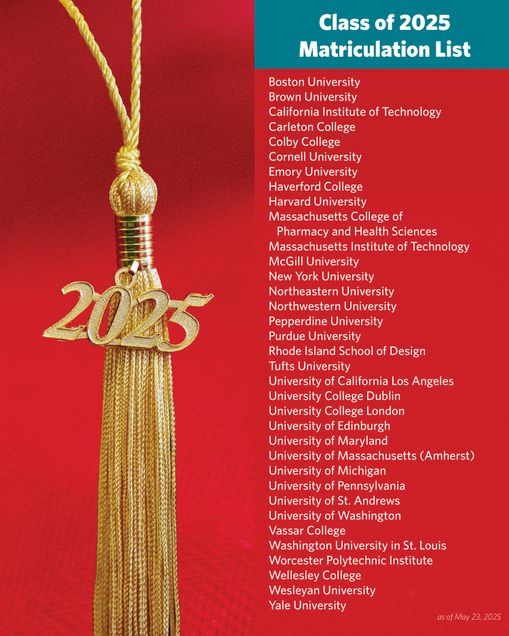
Class of 2025 Matriculation List
 On Monday, May 19, BUA graduated the Class of 2025 – the largest class in the school’s history – at a commencement ceremony featuring a keynote address by Boston University President Dr. Melissa Gilliam.
On Monday, May 19, BUA graduated the Class of 2025 – the largest class in the school’s history – at a commencement ceremony featuring a keynote address by Boston University President Dr. Melissa Gilliam.
As you can see from the impressive matriculation list below, the members of the BUA Class of 2025 have exciting paths ahead of them. Watch out, world -- these talented, passionate, determined young people are ready to make their mark. To our newest alums: we couldn’t be prouder of you. Stay in touch, drop us a postcard from your adventures, and don’t forget to stop by for a visit when you’re in town. Whether you’re heading across the street or across an ocean, you’ll always have a home at BUA.
Members of the BUA Class of 2025 will attend the following institutions:
Boston University
Brown University
California Institute of Technology
Carleton College
Colby College
Cornell University
Emory University
Haverford College
Harvard University
Massachusetts College of Pharmacy and Health Sciences
Massachusetts Institute of Technology
McGill University
New York University
Northeastern University
Northwestern University
Pepperdine University
Purdue University
Rhode Island School of Design
Tufts University
University of California Los Angeles
University College Dublin
University College London
University of Edinburgh
University of Maryland
University of Massachusetts (Amherst)
University of Michigan
University of Pennsylvania
University of St. Andrews
University of Washington
Vassar College
Washington University in St. Louis
Worcester Polytechnic Institute
Wellesley College
Wesleyan University
Yale University
*as of May 23, 2025
BUA Graduates Largest Class in School History
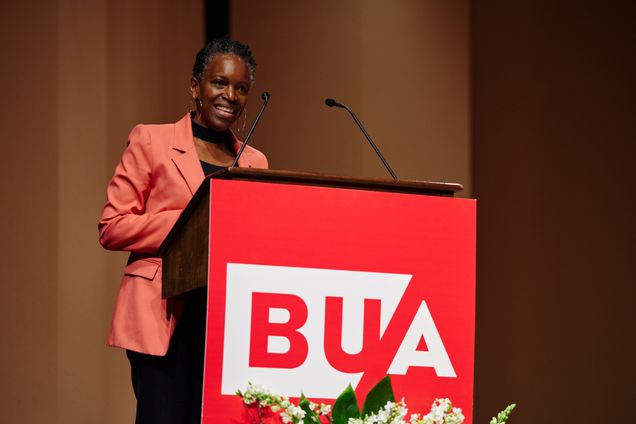
On Monday, May 19, Boston University Academy graduated the Class of 2025 -- the largest class in the school's history, at 67 members. President Dr. Melissa Gilliam delivered the commencement keynote address to a packed house at BU's Tsai Performance Center. The BUA Class of 2025 crossed the stage to receive their diplomas from Head of School Chris Kolovos and Associate Head of School Rosemary White. Rose Cairo '25 and Yiannis Asikis '25 delivered the student addresses; Egor Lazarevich '25 and Lucia Jankowich recited the Classics orations in Latin and Greek, respectively.
In her remarks, Dr. Gilliam, drawing on the many hats she has worn in her personal and professional lives, advised the Class of 2025:
“There is so much I want to tell you. As a doctor, I want to tell you exercise, minimize screen use, spend time in nature, spend time with people. As a mom I want to tell you to get enough sleep, drink water, and that you are perfect.
All of these things are true. But as a university president, whose job it is to fully educate a next generation of collegians and graduate students, I want to talk about this moment in time.
You are graduating at a remarkable moment in human history. You are graduating at a moment when bedrock institutions, knowledge, and practices are being questioned and challenged. You are graduating at a moment pregnant with the promises and pitfalls of technology. These inflection points call on us to think about what really matters. What can we preserve and what can we do without? There is a tension between innovation and conservation. I think you all who have studied Greek, Latin, ancient civilizations, sciences, and the humanities—a classical education—are very well positioned to think about these questions.”
BUA Inaugurates New Student Commons
 In a long-awaited and much-hoped for expansion, BUA significantly enlarged its physical footprint in the fall of 2024 by annexing the first floor in the rear section of One University Road – what used to be BU’s Student Activities Office. That space is now the BUA Student Commons, a multi-use area housing a large student lounge, student support offices, quiet study rooms, and an athletic training room.
In a long-awaited and much-hoped for expansion, BUA significantly enlarged its physical footprint in the fall of 2024 by annexing the first floor in the rear section of One University Road – what used to be BU’s Student Activities Office. That space is now the BUA Student Commons, a multi-use area housing a large student lounge, student support offices, quiet study rooms, and an athletic training room.
The Student Commons lounge – outfitted with bright, inviting furniture and a living moss wall – was an instant hit, and students across all grades wasted no time in making the space their own. Before school, students gather to do crossword puzzles, play games, or prepare for the coming day; friends chat and laugh together over lunch; after school, students read, relax, or get a head start on homework. The Student Commons has also been used to host affinity group celebrations, student activities, and school events.
 Beyond its role as a social hub, the Student Commons expansion has significantly enhanced BUA’s student support program. The quiet study room has improved teachers’ ability to administer extra-time testing, and students appreciate having a truly silent space in which to work. BU undergraduate tutors offer subject-specific academic support for BUA students during Homework Club. Clustering the offices of School Psychologist Stacey Weiskopf, Director of Student Support Jill Atkinson, and Learning Specialist Rachel Mansour together in the Student Commons has improved communication among that team and created a central hub for academic support and student wellbeing.
Beyond its role as a social hub, the Student Commons expansion has significantly enhanced BUA’s student support program. The quiet study room has improved teachers’ ability to administer extra-time testing, and students appreciate having a truly silent space in which to work. BU undergraduate tutors offer subject-specific academic support for BUA students during Homework Club. Clustering the offices of School Psychologist Stacey Weiskopf, Director of Student Support Jill Atkinson, and Learning Specialist Rachel Mansour together in the Student Commons has improved communication among that team and created a central hub for academic support and student wellbeing.
 The final piece of the renovation was the creation of a dedicated athletic training room – the first in BUA’s history. This space, which houses a treatment table and athletic training equipment and can be accessed both from the gym and from the Student Commons, enables BUA’s athletic trainer to properly assess, treat, and rehabilitate student athletes – a big upgrade from our former setup in Dave Stone’s office!
The final piece of the renovation was the creation of a dedicated athletic training room – the first in BUA’s history. This space, which houses a treatment table and athletic training equipment and can be accessed both from the gym and from the Student Commons, enables BUA’s athletic trainer to properly assess, treat, and rehabilitate student athletes – a big upgrade from our former setup in Dave Stone’s office!
The Student Commons space has been a game-changer for our school: with this addition, the entirety of the building at One University Road is occupied solely by BUA during the school day. We are grateful to BU for making this space available to us. The move speaks to BU’s faith in and commitment to BUA, especially considering the high demand for space across the University. We are likewise grateful to the donors in our community who recognized the impact that the new Student Commons would have on the lives of our students and chose to invest in this transformative renovation.
